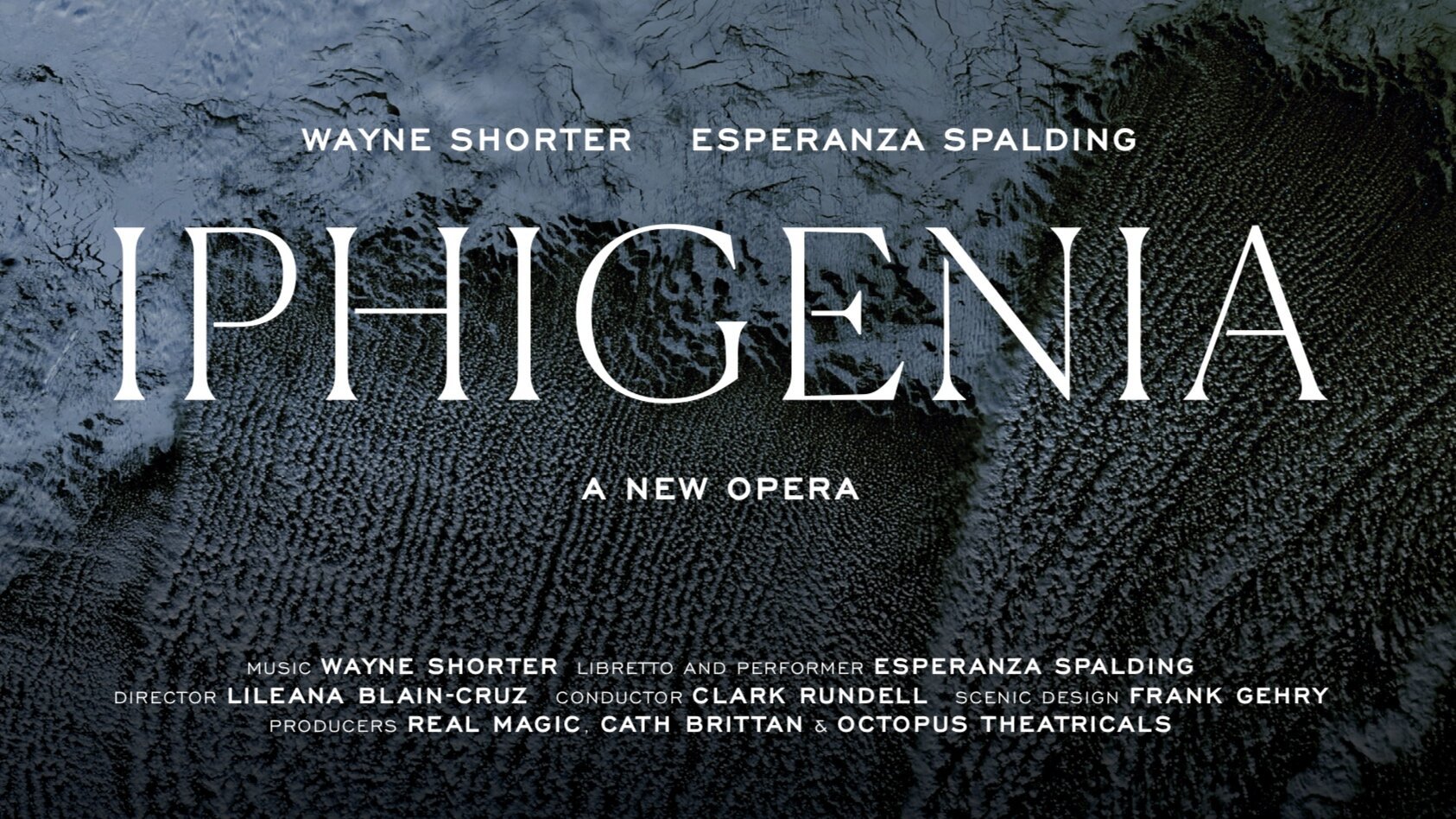
An opera created by Wayne Shorter and esperanza spalding
…(Iphigenia) is not an adaptation of the Greek myth as much as it is an intervention into myth-making itself, and an intervention into opera as we know it. Classical and jazz forms collide in a full orchestral score that features Shorter’s groundbreaking method of symphonic improvisation, with his venerated quartet at the center. spalding's libretto is deeply poetic and then suddenly radical – Iphigenia is multiplied, her identity is fractured and shared until the stage is occupied by a chorus of her.
Iphigenia was born to be sacrificed–or so the Greek myth would have us believe, but what if she contests her fate? What if the winds don’t blow and the sails hang limp in the sea air? …(Iphigenia) stares down the history of opera and makes some demands on its future: No more tragic women singing through suicide and going mad in perfect pitch. No more spectacles of women dead and dying. In the end Shorter and spalding turn their gaze outward beyond the stage: What will we make, they ask, at this precise moment in our collective present when we are so desperately in need of new visions for the world.
esperanza spalding
Bassist/composer/vocalist esperanza spalding combines influences and moves between musical worlds, performing and collaborating with the likes of Bruno Mars, Milton Nascimento, Jack DeJohnette, Guinga, George Duke, Janelle Monáe, Herbie Hancock, Prince, Stevie Wonder, and Wayne Shorter.
spalding collaborated with Gil Goldstein for her 2011 Chamber Music Society, breaking musical lines of jazz improvisation to classical music. This garnered her Best New Artist at the 53rd Grammy Awards, an unprecedented achievement by a jazz musician. The subsequently released Radio Music Society brought pop music together with a mosaic array of jazz legends and musicians. Both albums have led international music charts and gained multiple awards and Grammys.
spalding continues to expand the boundaries of her artistry. Recent projects include composing “Wild Rose” for Dianne Reeves’ album Beautiful Life and arranging “Boys In The Trees” for Carly Simon’s upcoming album. She has taught at Berklee College of Music and given numerous master classes and workshops throughout North America, Mexico, and Europe.
In her ongoing commitment to innovate and make the unprecedented her norm, spalding brings with her an ever-expanding collage of art and music along with devoted support for education, social justice, and environmental stewardship.
Wayne Shorter
Wayne Shorter has left an indelible mark on the development of music for the last half-century. He first rose to prominence in the late 1950’s as the primary composer for Art Blakey’s Jazz Messengers. He next joined the Miles Davis Quintet becoming what that bandleader referred to as the ensemble’s “intellectual musical catalyst” before co-founding the pioneering group Weather Report. Since 2001, he has led his own highly acclaimed quartet.
His works have been performed by the Chicago Symphony, Detroit Symphony, Lyon Symphony, National Polish Radio Symphonic Orchestra, Orpheus Chamber Orchestra, Prague Philharmonic and Royal Concertgebouw Orchestra. Acclaimed artists and ensembles as Renée Fleming and the Imani Winds have also performed his works. He has received commissions from the National, St. Louis, and Nashville Symphony Orchestras, the Los Angeles Philharmonic and the La Jolla Music Society. In all, Mr. Shorter has realized over 200 compositions and dozens of these works have become modern standards.
“Mr. Shorter’s mastery is in knocking down the wall between jazz and classical.”
- The New York Times
Creative Team
Wayne Shorter, Composer
Esperanza Spalding, Librettist and Performer
Clark Rundell, Conductor
Producers, Jeff Tang, Cath Brittan, Mara Isaacs
Performance History
World Premiere - Arts Emerson November 12-13, 2021
Kennedy Center, December 10-11, 2021
Cal Performances at UC Berkeley, February 12, 2022
The Broad Stage (Los Angeles, CA), February 17-19, 2022
“Our ...(Iphigenia) has at its core a sense of autonomy – in this adventure of life, you have freedom of choice. All cards are on the table and Iphigenia gets to choose, free of everything. Through her example, we can learn how to take a creative approach to everything, using the power of spontaneous engagement. The overarching sentiment is one of humanistic love, of wanting to re-awaken the dreams of youth, free of the pressures of adulthood.”
— esperanza spalding














